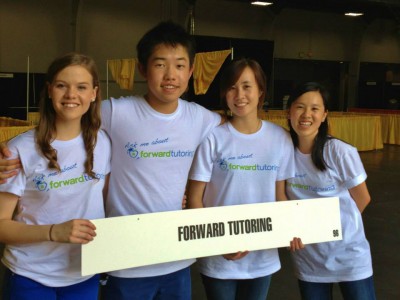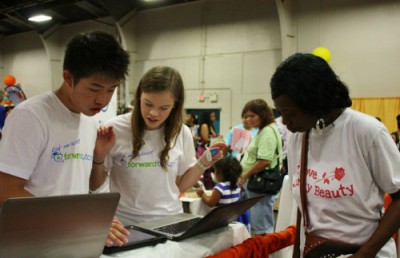Pay-it-Forward Tutoring
Students don’t always need teachers to learn. Sometimes they just need each other.
That was definitely true in the case of a group of high schoolers from Texas who saw their classmates struggling to get the tutoring they needed.
“There are so many other things attached when you want a tutor,” explains Mariko Nakamura, a graduate of Texas Academy of Mathematics and Science (TAMS) and a sophomore in molecular cell biology at UC Berkeley.
First, the financial cost. On average, an hour of tutoring costs somewhere between $30 and $50. Four tutoring sessions a month, can get close to $200. And then there is transportation to consider. Students who receive in-person tutoring either have to drive to the tutor or rely on parents to get them there.
And, Nakamura adds, “if the parents are working all the time, they have no way to get to the tutors.”
Nakamura and six other classmates at TAMS noticed all these factors and put their heads together. The result was Forward Tutoring, a web-based science and math tutoring program that doesn’t cost a thing—at least not in traditional currency.
Filling three holes
Rachel Nguyen was one of the first students to sign up for Forward Tutoring.
“I’ve always had trouble with science,” she admits. “Whenever I took a test, I wouldn’t do well.”
She was earning mostly C’s and B’s. Now, three months after signing up with Forwarding Tutoring, she is getting A’s.
Every week, Nguyen spends about an hour online with her tutor, someone she says feels more like a friend than a formal tutor. Using Forward Tutoring’s interactive whiteboard-style website, Nguyen can ask questions about chemistry and receive specific instruction from her tutor. For this, she doesn’t pay a cent. Rather, she “pays” for her tutoring out of a bank of earned community service hours.
This is the starting point for the three-point relationship that drives Forward Tutoring.
“Students need tutoring, tutors need community service hours, and [non-profit] organizations need volunteers,” Nakamura explains.
As Nakamura and her friends were considering how they could make tutoring more affordable for their classmates, they began wondering if they could fill this need by filling another need: namely, that ambitious high school and college students are often looking for volunteer hours to satisfy extracurricular requirements or to round out a resumé. Tutoring others could be a good way to satisfy this goal, as well as providing tutors the opportunity to contribute to something meaningful.
“The things that drive us aren’t necessarily money, but community service and helping others,” Nakamura says.
As well, someone in the group pointed out that many communities aren’t seeing as much volunteerism as they used to. What if they could provide more volunteers to charitable organizations by using volunteer hours as the currency that purchases tutoring hours?
“Instead of paying the tutors back with money, why not pay the community back with service?”
Students interested in receiving free tutoring reach out to Forward Tutoring, and Forward Tutoring connects them with an organization in their area that needs volunteers for a specific event or ongoing commitment. For every hour that a student volunteers with the organization, he or she earns three credits toward tutoring. Each credit adds about to about 15 minutes of tutoring time.
Since launching the program in 2011, Forward Tutoring has helped 700 students with questions; 25 of them receiving regular tutoring help from one of 70 available tutors. As well, students have volunteered 425 hours at a variety of organizations around Dallas, including a food pantry and a shelter for victims of domestic violence.
Tutoring with heart
 “Online tutoring doesn’t have to be expensive and impersonal,” Nakamura says. “It can be personal; it can be inexpensive and convenient.”
“Online tutoring doesn’t have to be expensive and impersonal,” Nakamura says. “It can be personal; it can be inexpensive and convenient.”
There are two reasons for this: the ease of the tutoring website, and the passion of the tutors.
The group of students from TAMS launched a beta version of the site in 2011 that allowed students from anywhere in the country to ask questions on demand to live tutors who were standing by. After receiving a grant of $20,000 from the Murphy Entrepreneurship Center at the University of North Texas, they hired a group of computer coders to help them refine the site to increase their ability to facilitate one-on-one tutoring on a weekly basis. Nguyen was one of the first students to sign up for regular, ongoing tutoring.
According to co-founder and Yale sophomore Mitchell Powell, this ongoing, relational tutoring is the fuel that feeds Forward Tutoring. From his dorm room in Connecticut, Powell himself has been tutoring a single mom in California who is working toward her GED. Powell usually meets with her twice a week to assist her with math. Tutoring someone who really needs the help is what keeps him going.
“For me, the most rewarding part of tutoring is being able to really see the epiphany moment in the student,” he says. ” The feeling of knowing that I helped this student understand this, and to see that knowledge really click in the student, makes it worth it for me.”
At some point in the future, they also hope to create a scholarship program as a way to thank and compensate tutors. Nakamura says they also want to establish more of a presence throughout the country, as most of the relationships between students and volunteer organizations currently occur in Texas. Recently, they were awarded the grand prize at the Dell Education Challenge. But it isn’t accolades that keep them going: as long as they are making students happy, that’s all the real success they ask for.
“Seeing tutoring come to life is what keeps us going,” says Nakamura.






